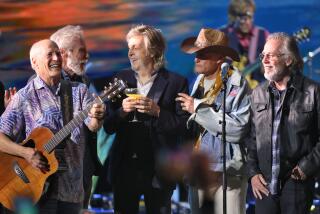‘Our Michael’ Feinstein Serenades Jewish Home Residents
- Share via
Cabaret-singer Michael Feinstein was at the piano Wednesday night crooning the romantic Irving Berlin melody “Always.” The lights were dim. The audience huddled around tables, holding drinks, some wistfully humming along.
It seemed like a typical scene for Feinstein, the cabaret star who has performed at San Francisco’s Plush Room and the Algonquin in New York, in addition to the Hollywood Bowl, the White House and Buckingham Palace.
But this was no regular nightclub. The white-haired members of the 200-plus audience--average age 75--sat at big round tables on a linoleum floor drinking water out of Styrofoam cups. This was the dining hall at the Jewish Home for the Aging’s Victory Village residence in Reseda, decorated with streamers and signs saying “Welcome Back Michael.”
It was here that Feinstein got his start 13 years ago, performing weekly as a 20-year-old volunteer. He last played there more than eight years ago.
“It’s good to be back,” he said with emotion in an interview after the hourlong performance. “It’s a life-affirming experience for me, to come back here and see these older people so alive and vital.”
Feinstein admitted that the feeling in the room was different from a cabaret or nightclub. “It’s rare to get a feeling of unconditional love at a nightclub,” he said.
The residents of the private retirement home love “their Michael,” especially those who remember the skinny kid in sneakers who used to played for them.
Feinstein’s core fan club, three women sitting together during the show, ogled him. “You’re my Michael,” Rose Tammer, 86, called out. “He belongs to all of us. We’re all his grandmothers,” corrected Rae Cohen, also 86. Cohen, who takes 18 pills a day for a heart condition, said, “It’s amazing what Michael can do for a person like me.”
“Did you see? He kissed me,” Tammer said. “I tell people he’s my boyfriend. I wish he would sing to me as his sweetheart.”
Her wish was granted. While Feinstein sang “Makin’ Whoopee,” he glanced over at the three with an impish grin. They blushed and giggled like schoolgirls.
Ruth Shapiro, 82, the third of the die-hard Feinstein fans, glowed. “It’s a blessing he’s able to come back to us,” she says.
Feinstein said it was unique to play to a crowd so familiar with his repertoire of tunes from the ‘20s, ‘30s and ‘40s. “They can appreciate the songs more. This music sparks strong memories for them; something special and different happens when I play it here.
“And I better not make a mistake, because they know all the words,” he added.
Feinstein said that his music is the best way for him to communicate with the elderly. “It helps me to feel a strong connection with these people.”
Feinstein started playing at the home when his family moved to Canoga Park from Columbus, Ohio. In Ohio, Feinstein had played at the home where his grandmother lived. “Playing in a nursing home became a habit for me,” he added. “It was great to see people, who were often quiet and withdrawn, come back to life.”
When he played at the Jewish Home for the Aging regularly, he would perform for not just for the ambulatory patients but for the seriously ill as well. “That was the most gratifying for me. People who could barely talk would open their mouths and start singing.”
Walter Schnell, 85, president of the Victory Village residents, determined to have Feinstein return for a concert. Schnell called Feinstein’s office at least twice a week for almost two years. “When his secretary called to say he could play here again, I was overjoyed,” said Schnell.
Feinstein said he won’t wait another eight years for his next visit: “I’ve been away for too long.”
More to Read
The biggest entertainment stories
Get our big stories about Hollywood, film, television, music, arts, culture and more right in your inbox as soon as they publish.
You may occasionally receive promotional content from the Los Angeles Times.










